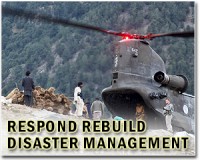| . |  |
. |
Frankfurt (AFP) Jan 3, 2011 The Haiti earthquake and floods in Pakistan and China helped make 2010 an exceptional year for natural disasters, killing 295,000 and costing 130 billion dollars, the world's top reinsurer said Monday. "The high number of weather-related natural catastrophes and record temperatures both globally and in different regions of the world provide further indications of advancing climate change," said Munich Re in a report. The last time so many people died in natural disasters was in 1983, when 300,000 people died, mainly due to famine in Ethiopia, spokesman Gerd Henghuber told AFP. A total of 950 natural disasters were recorded last year, making 2010 the second worst year since 1980. The average number of events over the past 10 years was 785. And in terms of economic cost, insured losses amounted to approximately 37 billion dollars, putting 2010 among the six most loss-intensive years for the insurance industry since 1980. "2010 showed the major risks we have to cope with. There were a number of severe earthquakes. The hurricane season was also eventful," said Torsten Jeworrek, the firm's chief executive. The earthquake in Haiti in January was by far the worst disaster in terms of human cost, killing 222,570 people, Munich Re said. Some 56,000 died in a combination of heatwaves and forest fires in Russia, it said. The other most destructive events were an earthquake in China in April that killed 2,700, floods in Pakistan between July and September that cost 1,760 lives and August floods in China in which 1,470 perished. Although the Haiti earthquake resulted in human devastation on a "staggering scale", it cost the industry very little as very few people in the poverty-stricken country can afford insurance. However, an earthquake in Chile that hit over a month later was the world's most expensive natural disaster last year, with overall losses of 30 billion dollars and insured losses of eight billion dollars. The second most expensive disaster for the insurance industry was a series of earthquakes that rattled New Zealand, which cost an estimated 3.3 billion dollars but caused no deaths. The global distribution of natural catastrophes in 2010 was however "comparable to that of previous years," Munich Re said. Most disasters, 365, occurred on the American continent, with 310 in Asia. A total of 120 natural disasters were recorded in Europe, 90 in Africa and 65 in Australia and Oceania. In 2009, considered a "benign" year due to the absence of major catastrophes and a less severe than usual hurricane season in the North Atlantic, there were 900 "destructive natural hazard events", costing some 60 billion dollars. Around 11,000 people lost their lives in natural disasters in 2009, well below the average of 77,000. Last month, another major reinsurer, Swiss Re, reported that man-made and natural disasters generated worldwide economic losses of 222 billion dollars in 2010, more than three times the figure for the previous year.
Share This Article With Planet Earth
Related Links Bringing Order To A World Of Disasters A world of storm and tempest When the Earth Quakes
 Adopted Haitian children fly in to Paris on Christmas Eve
Adopted Haitian children fly in to Paris on Christmas EveParis (AFP) Dec 24, 2010 A second French government-chartered plane bringing 84 Haitian children to their adoptive French parents arrived in Paris on Friday morning where icy weather had grounded many Christmas flights. The Boeing 747 from Port-au-Prince was also carrying parents and medical personnel, after a first flight carrying 114 children arrived on Wednesday. Having arrived from the Caribbean, the childr ... read more |
|
| The content herein, unless otherwise known to be public domain, are Copyright 1995-2010 - SpaceDaily. AFP and UPI Wire Stories are copyright Agence France-Presse and United Press International. ESA Portal Reports are copyright European Space Agency. All NASA sourced material is public domain. Additional copyrights may apply in whole or part to other bona fide parties. Advertising does not imply endorsement,agreement or approval of any opinions, statements or information provided by SpaceDaily on any Web page published or hosted by SpaceDaily. Privacy Statement |